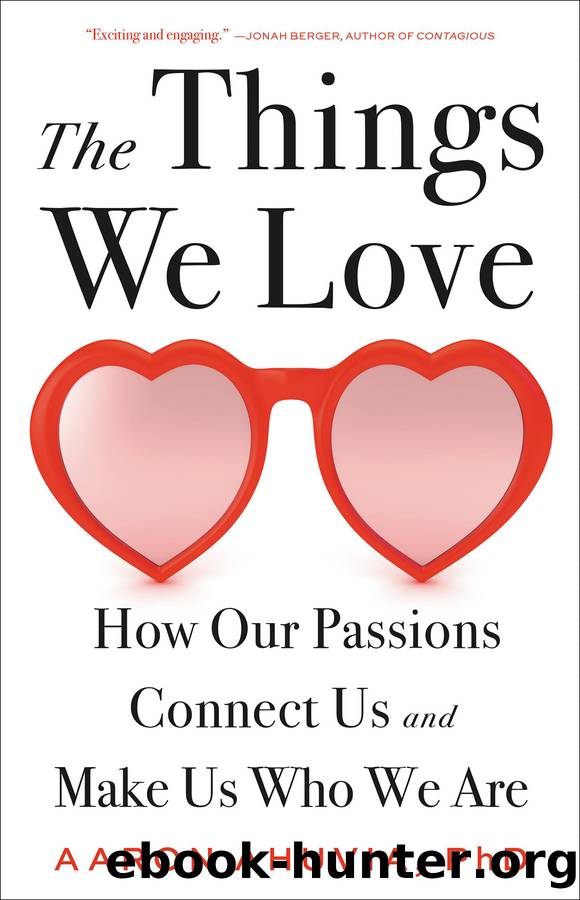The Things We Love by Aaron Ahuvia

Author:Aaron Ahuvia [AHUVIA, AARON]
Language: eng
Format: epub
Publisher: Little, Brown and Company
Published: 2022-07-19T00:00:00+00:00
Middle Age and Later: Coasting on Autopilot
As people hit their twenties, they often cultivate grown-up tastes. For example, in my opinion, nothing goes better with a piece of chocolate cake than a glass of cold milk. But if Iâm in a fancy restaurant, Iâll probably choose coffee. Milk is literally the earliest childhood taste. It just doesnât seem appropriate in a sophisticated adult setting.
The exploratory phase that starts in the teenage years may last into a personâs thirties or forties. But our openness to new things slows down dramatically as we get close to middle age. Neuroscientist Robert Sapolsky3 has shown that our tendency to stop developing tastes for new things is linked to physical changes in the brain that occur around this age. The introduction of sushi into American cuisine in the late 1980s provided Sapolsky with excellent circumstances in which to test his theory. He discovered that people who were thirty-nine years of age or older when sushi was introduced rarely developed a taste for it, while those who were thirty-eight or younger often grew into ardent sushi lovers.
Have you ever wondered why so many people are convinced that whatever music happened to be popular when they were young is the best music ever created? Sapolsky found that most people were younger than twenty when they first heard the type of music they would love for the rest of their lives. Moreover, if people are thirty-five or older when they first hear a new style of music, there is more than a 95 percent chance that they wonât like it (âThatâs not music; thatâs just noise!â). This was confirmed in a study by the music-streaming site Deezer, which found that the peak age for discovering new music was twenty-four and that most people stopped discovering new music around the age of thirty.
Older folks often believe that the reason they dislike new music is that it simply isnât very good. While the music of your youth was, undoubtedly, just as great as you think it was, we live in a world bursting with far more great new stuff of all kinds than in any previous era. Iâll use music as an example, but the basic idea holds true for almost all forms of art and entertainment.
Both nature and nurture play a role in the making of a musical genius.4 On the nature side of things, there is a genetic component to musical ability, and a few people are blessed with astonishing levels of talent. The average level of innate musical ability in the population may be increasing slightly. The argument for this claim is that musical talent is positively correlated with a personâs overall IQ, and average IQ has been slowly increasing since it started being measured more than a hundred years ago, a phenomenon known as the Flynn effect.5 But to be conservative, instead of saying that musical intelligence is increasing, we can assume that it has remained more or less the same. Since the population of the
Download
This site does not store any files on its server. We only index and link to content provided by other sites. Please contact the content providers to delete copyright contents if any and email us, we'll remove relevant links or contents immediately.
| Advertising | Consumer Behavior |
| Customer Service | Marketing |
| Public Relations | Sales & Selling |
| Search Engine Optimization |
Influence: The Psychology of Persuasion by Robert B. Cialdini(4796)
The Miracle Morning by Hal Elrod(4727)
The Hacking of the American Mind by Robert H. Lustig(4383)
Pre-Suasion: A Revolutionary Way to Influence and Persuade by Robert Cialdini(4232)
Unlabel: Selling You Without Selling Out by Marc Ecko(3663)
Ogilvy on Advertising by David Ogilvy(3622)
Hidden Persuasion: 33 psychological influence techniques in advertising by Marc Andrews & Matthijs van Leeuwen & Rick van Baaren(3565)
Purple Cow by Seth Godin(3203)
Who Can You Trust? by Rachel Botsman(3133)
Kick Ass in College: Highest Rated "How to Study in College" Book | 77 Ninja Study Skills Tips and Career Strategies | Motivational for College Students: A Guerrilla Guide to College Success by Fox Gunnar(3129)
The Marketing Plan Handbook: Develop Big-Picture Marketing Plans for Pennies on the Dollar by Robert W. Bly(3062)
This Is Marketing by Seth Godin(3038)
I Live in the Future & Here's How It Works by Nick Bilton(2997)
The Power of Broke by Daymond John(2988)
The Tipping Point by Malcolm Gladwell(2922)
Building a StoryBrand by Donald Miller(2915)
The 46 Rules of Genius: An Innovator's Guide to Creativity (Voices That Matter) by Marty Neumeier(2855)
Draw to Win: A Crash Course on How to Lead, Sell, and Innovate With Your Visual Mind by Dan Roam(2784)
Market Wizards by Jack D. Schwager(2700)
